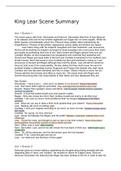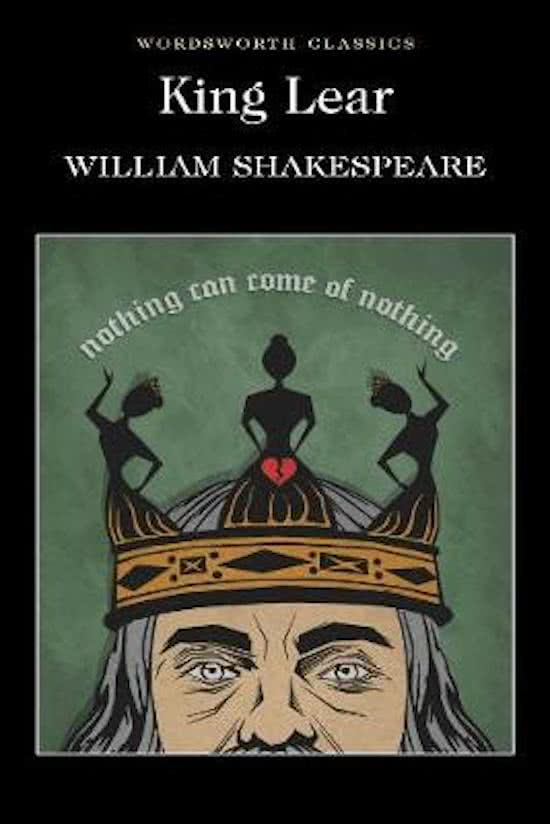King Lear Scene Summary
Act 1 Scene 1:
The scene opens with Kent, Gloucester and Edmund. Gloucester tells Kent of how Edmund
is his bastard child and he has another legitimate son Edgar who he loves equally. Whilst his
father speaks inconsiderately about him, Edmund stays politely silent emphasising his
insignificance. Themes of favouritism, appearance versus reality and division are raised.
Lear enters along with his subjects, daughters and their husbands. Lear announces
that he will be dividing his kingdom amongst his three daughters who must prove their worth
and loyalty by professing their love to him. Both Goneril and Regan declare their love but
Cordelia refuses, as she recognises how sycophantic and contrived their speeches are.
Goneril and Regan get equal splits of the land and Cordelia is banished for her stubborn and
brutal honesty. Kent intervenes to save Cordelia but also gets banished in doing so. Lear
announces to Goneril and Regan although they hold the power, Lear will still be named as
King but hold none of the responsibility. He also states that they shall house him and his
hundred knights in alternating months. Burgundy and France then debate who shall marry
Cordelia now she has been banished and has no dowry. Albany refuses to marry her but
France admires her honesty and offers to marry her. The scene ends with Regan and
Goneril discussing their new responsibility to their father and how displeased they are.
Key Quotes:
Gloucester- ‘I have a son (...) who yet is no dearer in my account’ Theme of favouritism.
Lear- ‘that future strife might be prevented’ Irony, could argue that his intentions were moral.
Goneril- ‘Dearer than eyesight, space and liberty’ motif of eyesight. Tripartite structure, hyperbole,
contrived, sycophantic.
Goneril- ‘A love that makes breath poor and speech unable’
Regan- ‘Only she comes too short, that I profess myself and enemy to all other joys’
Cordelia- ‘I am sure my love’s more ponderous than my tongue’ Disapproves of her sister’s
pandering
Lear- ‘what can you say to draw a third more opulent than your sisters?’ Theme of favouritism
Lear- ‘Nothing will come of nothing’ Motif
Cordelia- ‘I love your majesty according to my bond, no more nor less’ Cordelia’s honesty, lack of
bias, loyalty.
Cordelia- ‘So young, my lord, and true’
Lear- ‘Come not between the dragon and his wrath!’ Metaphor, exclamative, indefinite article ‘most’.
Inflated ego.
Lear- ‘I loved her most, and thought to set my rest on her kind nursery’ Theme of favouritism,
psychoanalytical- sexual desire, inversion of order to mother and child’
Kent- ‘When Lear is mad’ Motif, polysemic
Kent- ‘See better, Lear, and let me still remain the true blank of think eye.’ Motif of sight, Lear is
morally blind
Kent- ‘ Do, kill thy physician, and thy fee bestow upon the foul disease.’
Cordelia- ‘If for I want that glib and oily art’
Lear- ‘ nor shall ever see that face of hers again’
Act 1 Scene 2:
Edmunds gives an honest soliloquy addressing his thoughts about being branded with the
degrading titles of ‘base’ and ‘bastard’. He reveals his desire for Edgars lands. Edmund
deceives Gloucester into believing that Edgar has been plotting to kill him in order to take his
, lands by forging a note. Gloucester disowns Edgar but Edmund convinces him to wait and
see what Edgar will have to say when he visits. Edgar enters and Edmund tells him that he
has offended his father in some way so he must enter the house armed. Edmund has
successfully manipulated both Gloucester and Edgar into their own demise.
Key Quotes:
Edmund- ‘Why bastard? Wherefore base?’
Edmund- ‘Why brand us with base? With baseness, bastardy? Base, base?’
Edmund- ‘Legitimate Edgar, I must have your land. Our father’s love is to the bastard
Edmund as to the legitimate.’
Gloucester- ‘if it be nothing, I shall not need spectacles’.
Edmund- ‘sons at perfect age and fathers declined, the father should be as ward to the son’
Gloucester- ‘O villain, villain!’
Gloucester- ‘The King falls from bias of nature- there’s father against child’
Edmund- ‘that when we are sick in fortune, often the surfeits of own behavior, we make
guilty of our disasters’
Edmund- ‘my cue is villainous melancholy, with a sigh like Tom o’Bedlam’
Edgar- ‘some villain hath done me wrong’
Edmund- ‘whose nature is so far from doing harms hat he suspects none’
Edmund- ‘if not by birth, have lands by wit’
Act 1 Scene 3:
Goneril is speaking to Oswald about Lear and her plans about how to handle him.
Key Quotes;
Goneril- ‘by day and night he wrongs me’
Goneril- ‘Idle old man, that still would manage those authorities that he hath given away’
Act 1 Scene 4:
Kent has disguised himself in order to serve Lear without his knowing and professed his
loyalty and offered his service. Lear calls for Oswald to bring him his Fool and he disrespects
him. The Fool enters with a series of puns and double entendres and tells Lear that he has
made a mistake in handing over his power to Goneril and Regan. Goneril arrives to speak
with Lear. She tells him that his servants and knights have been so disorderly that he will
have to send some of them away whether he likes it or not. Lear curses Goneril for this so
that she may not bear children. When Lear has gone, Goneril argues with her husband,
Albany, who is upset with the harsh way she has treated Lear. She says that she has written
a letter to her sister Regan, who is likewise determined not to house Lear’s hundred knights.
Key Quotes:
Kent- ‘you have that in your countenance that I would fain call master’
Knight- ‘Since my young lady’s going to France, sir the Fool hath much pined away.’
Oswald- ‘My lady’s father’
Lear- ‘Thou servest me and I’ll love thee’
Fool- ‘Can you make no use of nothing, nuncle?’
Lear- ‘Why no, boy; nothing can be made out of nothing’
Lear- ‘Dost thou call me fool, boy?’
Fool- ‘All thy other titles hast given away’
Fool- ‘E’er since thou mad’st thy daughters thy mothers;
Fool- ‘ I had rather be any kind o’thing than a fool, and yet I would not be thee, nuncle’
Fool- ‘I am a fool, thou art nothing’





